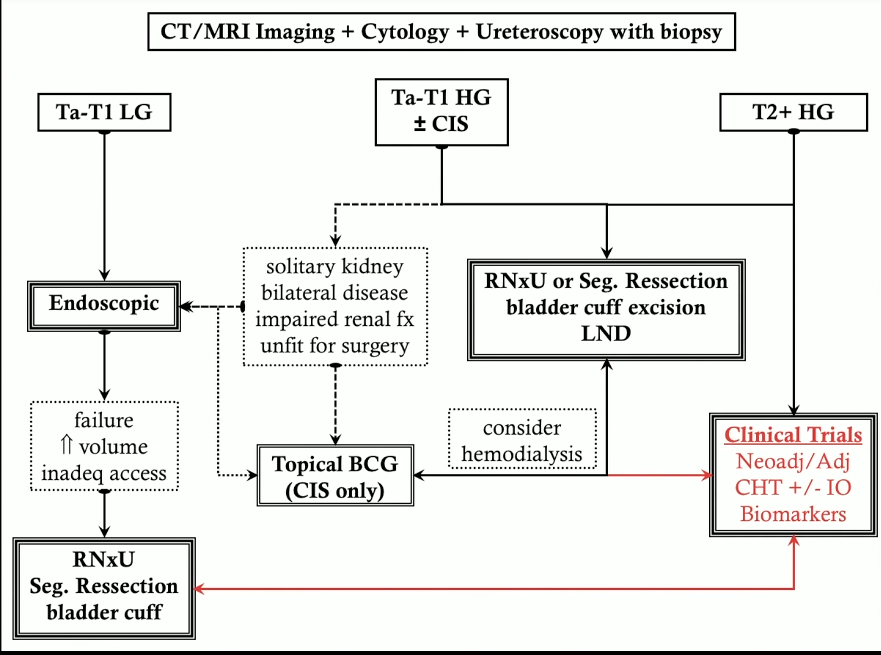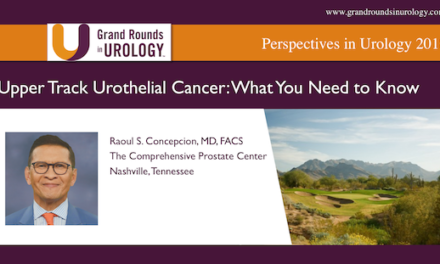Guilherme Godoy, MD, MPH, presented “Management of Upper Tract Urothelial Cancer” during the 23rd Annual Innovations in Urologic Practice on September 14, 2018 in Santa Fe, New Mexico.
How to cite: Godoy, Guilherme. “Management of Upper Tract Urothelial Cancer” September 14, 2018. Accessed [date today]. https://grandroundsinurology.com/management-of-upper-tract-urothelial-cancer/
Management of Upper Tract Urothelial Cancer – Summary:
Guilherme Godoy, MD, MPH, provides a brief overview of the pathogenesis and epidemiology of upper tract urothelial carcinoma (UTUC). He then reviews genomic classification, diagnosing and staging, current oncological principles of surgical therapy, and new risk-adapted treatment options for the disease.
Abstract:
UTUC is a multifocal disease with a propensity to recur, and accounts for 90% of all urothelial cancers. Of those cancers, UTUC accounts for 5% of those cases and renal tumors account for 5%-7%. Balkan endemic nephropathy (BEN), as well as behavioral, occupational, and hereditary factors ascribe to the epidemiology and etiology of UTUC.
New data describing unique molecular and clinical subtypes of the disease supports using the genomic classification to drive therapy. Additionally, recent data from Memorial Sloan Kettering correlates genomic alterations of tumors biopsy samples to nephroureterectomy specimens.
Hematuria, flank pain, dysuria, and consumptive symptoms are indications to consider when diagnosing and staging UTUC. Patients should first undergo radiologic diagnostic evaluation to rule out possible differential diagnoses. However, endoscopic or ureteroscopic tests, histologic information from biopsy, cytology, or a combination of methods, may provide more diagnostic accuracy. The updated National Comprehensive Cancer Network (NCCN) TNM Staging System provides further guidance, specifically in nodal staging.
Radical nephroureterectomy (NU) with bladder cuff excision is currently the standard of care surgery for UTUC. Overall, evidence supports a laparoscopic NU approach over an open approach. Acceptable methods for the management of distal ureter and bladder cuff excision include intravesical or extravesical cystostomy, as well as transurethral resection and disarticulation.
While there are appropriate conservative options for non-muscle invasive, low-grade UC, there are few options for non-muscle invasive, high-grade tumors. Mapping lymph node metastases can help to guide lymph node dissection. New technologies, such as narrow-band imaging and endoluminal ultrasound, can aide in the identification of tumors. There are limited conservative options for invasive, high-grade tumors, but emerging evidence regarding MitoGel™, perioperative chemotherapy, and neoadjuvant chemotherapy are encouraging.
About Innovations in Urologic Practice
Innovations in Urologic Practice (IUP) is an annual CME-accredited conference devoted to updating urologists on the rapidly changing healthcare environment. Topics focus on innovative diagnostic and treatment strategies, controversies, new and currently developing technologies, and challenges in today’s urologic practice. Dr. Godoy presented this lecture during the 23rd IUP in 2018. Please visit this page in order to learn more about future IUP meetings.
ABOUT THE AUTHOR
Guilherme Godoy, MD, MS, serves as assistant professor of urology at the Baylor College of Medicine (BCM) in Houston, Texas. He joined the faculty of the Scott Department of Urology at BCM in 2012 and has been the chief of the urology service at Ben Taub General Hospital (Harris Health System), since 2017.
Dr. Godoy earned his medical degree from Fundacao Universitaria do ABC in Sao Paulo, Brazil. His training includes an internship and residency in urology at Santa Casa De Sao Paulo in Vila Buarque, Brazil, and a fellowship in urologic oncology at BCM. Dr. Godoy has also completed urologic oncology fellowship training at Vancouver General Hospital, New York University, and Memorial Sloan-Kettering Cancer Center. He earned his MS in clinical investigations at BCM and has remained active in clinical research, translational studies, and clinical trials, mostly focused on prostate, urothelial (upper and lower urinary tract), and testicular cancers.
Dr. Godoy’s expertise includes early diagnosis, minimally invasive approaches (endoscopic and robotic), utilization of molecular and genetic tools for personalized decision-making, management of hereditary cancers, and surgical management of complex/large genitourinary (GU) tumors. His clinical areas of interest include adrenal and kidney tumors, urothelial cancers (upper and lower urinary tract including ureter, renal pelvis, bladder, and urethra), prostate cancer, penile cancer, and testicular and paratesticular cancers. Dr. Godoy also specializes in the utilization of intestinal segments for urinary tract reconstructions, and coordination of multidisciplinary approaches to manage complex intra-abdominal, retroperitoneal, and pelvic tumors. Dr. Godoy is responsible for and moderates the GU Tumor Board Meetings at Baylor St. Luke’s Medical Center as well as the St. Luke’s International GU Tumor Board Meetings.





